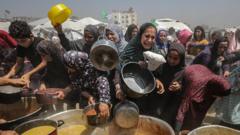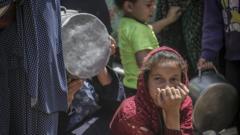The Integrated Food Security Phase Classification warns of a critical risk of famine, with nearly half a million people facing starvation.
Critical Famine Risk for Gaza's 2.1 Million Residents, UN Assessment Warns

Critical Famine Risk for Gaza's 2.1 Million Residents, UN Assessment Warns
A UN report reveals that the entire population of Gaza faces severe food insecurity as the Israeli blockade continues.
The Integrated Food Security Phase Classification (IPC), supported by the United Nations, has issued a dire warning stating that the entire population of Gaza, approximately 2.1 million Palestinians, is at an alarming risk of famine. This comes amid a prolonged Israeli blockade on humanitarian aid, which has severely exacerbated an already dire food security situation. The IPC's recent findings indicate a significant decline in food availability since October 2024, although it clarified that famine conditions are not yet present.
According to the report, nearly 244,000 individuals are currently experiencing "catastrophic" levels of food insecurity, necessitating immediate intervention as the chance of famine looms closer. The brief ceasefire between Israel and Hamas provided temporary relief; however, the renewal of military actions in mid-March has reversed these gains, halting humanitarian supplies for over two months.
Israeli authorities maintain that there is no widespread hunger crisis, citing the influx of aid during the ceasefire period as evidence. International backlash against the blockade intensifies, with calls from domestic and international bodies, including the UN, for action to allow humanitarian assistance into the region. The blockade has been labeled by aid organizations as a potential war crime, accusing it of functioning as a mechanism of starvation against the civilian population.
The IPC's report highlights that about 1.95 million people — 93% of Gaza's residents — are experiencing significant food insecurity. Nearly 71,000 children under five years of age are projected to suffer acute malnutrition over the next year. Households are resorting to desperate measures, including scavenging and begging for food.
The situation arose following Hamas-led attacks on southern Israel on October 7, 2023, resulting in approximately 1,200 casualties and the abduction of over 250 individuals. As hostilities continue, Israeli Prime Minister's office has asserted plans to expand military operations against Hamas, emphasizing their strategy to take control of the territory indefinitely, while humanitarian efforts remain hampered by the ongoing blockade.
The IPC, a global coalition of UN agencies, governments, and non-profits, serves as a decisive mechanism in evaluating famine risks, highlighting the urgent need for humanitarian access to avert catastrophe for thousands facing starvation in Gaza.
According to the report, nearly 244,000 individuals are currently experiencing "catastrophic" levels of food insecurity, necessitating immediate intervention as the chance of famine looms closer. The brief ceasefire between Israel and Hamas provided temporary relief; however, the renewal of military actions in mid-March has reversed these gains, halting humanitarian supplies for over two months.
Israeli authorities maintain that there is no widespread hunger crisis, citing the influx of aid during the ceasefire period as evidence. International backlash against the blockade intensifies, with calls from domestic and international bodies, including the UN, for action to allow humanitarian assistance into the region. The blockade has been labeled by aid organizations as a potential war crime, accusing it of functioning as a mechanism of starvation against the civilian population.
The IPC's report highlights that about 1.95 million people — 93% of Gaza's residents — are experiencing significant food insecurity. Nearly 71,000 children under five years of age are projected to suffer acute malnutrition over the next year. Households are resorting to desperate measures, including scavenging and begging for food.
The situation arose following Hamas-led attacks on southern Israel on October 7, 2023, resulting in approximately 1,200 casualties and the abduction of over 250 individuals. As hostilities continue, Israeli Prime Minister's office has asserted plans to expand military operations against Hamas, emphasizing their strategy to take control of the territory indefinitely, while humanitarian efforts remain hampered by the ongoing blockade.
The IPC, a global coalition of UN agencies, governments, and non-profits, serves as a decisive mechanism in evaluating famine risks, highlighting the urgent need for humanitarian access to avert catastrophe for thousands facing starvation in Gaza.




















